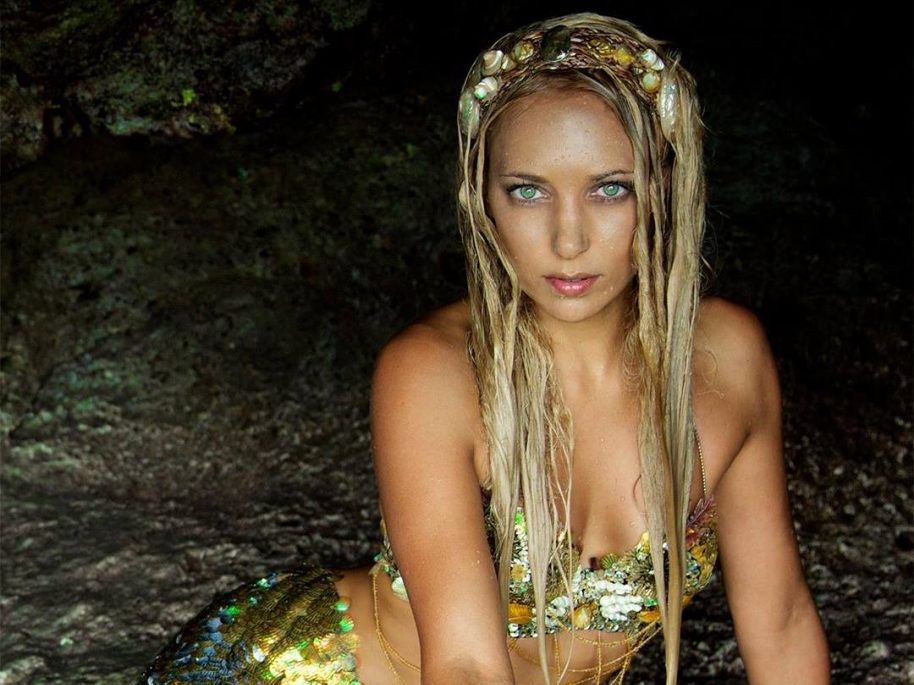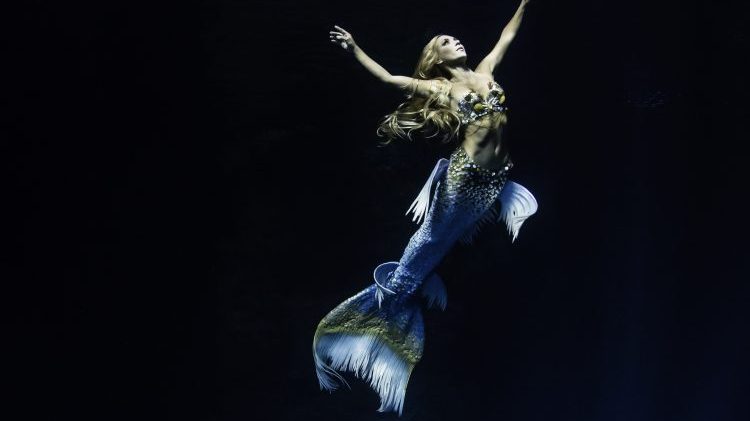Photo: Shawn Heinrichs.
Mermaids and mermen are having a moment. From Guillermo del Toro’s The Shape of Water to Melissa Broder’s new merman novel The Pisces, mer-creatures are the latest entertainment trend. No one embodies the mermaid fervor more than Los Angeles-based freelance mermaid Hannah Fraser.
“There’s a rise of the feminine at this point in time, where women are really coming into their own and saying, ‘We are amazing, sensual, wonderful beings.’ The mermaid is such a gorgeous representation of the femininity and the sensuality of a woman and yet she’s kind of this autonomous being. She’s out there in the ocean, being a badass, doing her own thing. And then I think there’s the eco side, which is we are all starting to wake up and realize we’re not treating Mother Earth in the way to facilitate life continuing on this planet.”
Adorned in her intricate, handmade tails, Fraser has performed underwater at aquariums as far flung as Dubai and Bangkok. She was the “living logo” of Atlantis in the Bahamas for a year. And she loves to do photo and video shoots in the ocean, where she’s swum with great white sharks, tiger sharks, whale sharks, Manta rays, whales, dolphins, seals, and turtles. “That really woke me up to how awesomely interactive these animals are, how they’re not as scary and dangerous as people believe and the media leads us to believe,” she says.
Fraser wasn’t always this fearless. But the more she learns about the animals she swims with, the more awe and respect she feels towards them. Being able to predict their movement patterns helps as well. She recalls how once she was in the middle of the ocean, mermaid tail affixed, when a great white shark came directly towards her instead of circling around her to check her out, as sharks typically do. The animal wasn’t on the attack but it was curious. Fraser had been advised not to swim away, because that might ignite the shark’s predatory instincts. Instead, she swam towards the shark with her hands up and screamed at it. “I acted in a way that was not dinner, so the shark just turned around and took off,” she says. “It’s a dangerous job. No way around it. All you can do is learn as much as you possibly can, have all of your scenarios worked out, understand the animals that you’re working with to the best of your ability, and don’t make silly mistakes.”

Keeping calm is key to professional mermaid-ing. Since her youth, Fraser has trained in meditation, breathwork, and yoga, skills that come in handy in high-stress situations in the water. The meditation keeps her mind sharp and able to assess the danger without freaking out, breathwork helps her hold her breath longer, and yoga keeps her spine flexible so she can handle the intense physicality of swimming.
Are there detrimental side effects to holding her breath so long, so often? Not as long as you “don’t black out and die,” Fraser says with a laugh. “You’re generally not ever pushing past a place where it’s doing any kind of damage.”
It’s important to take care of your body on land, too: What Is ‘Macro’ Anyway? A Handy Guide To Getting Healthy
There are other occupational hazards: frequent colds, the flu, sun damage, and ear and eye infections. She also has to reckon with currents, cold temperatures, heavy costumes, and blurry vision when performing in the water.
But it’s worth it for Fraser, who has been obsessed with mermaids since childhood. When she saw the movie Splash starring Tom Hanks and Daryl Hannah in the ‘80s, she realized she could become one.
She made her first tail at age 9 from pillow stuffing and plastic tablecloth material and swam around in the pool with it. “It was highly non-function,” she says. “It did more to drown me than to help me swim around.”
As an adult, she moved to Byron Bay, a “gorgeous, sub-tropical paradise” on the southeastern coast of Australia. She had worked as a graphic designer and illustrator for books as well as started a paper product business featuring her mermaid art. She also got into modeling and costume design. All her interests and skills converged when she arrived at a casting for an underwater shoot, where there were 300 girls that were prettier, younger, and taller than Fraser.
Turns out there are plenty of professions you never knew existed: How Eddie Huang Is Helping Create ‘Vape Cuisine’
“One by one, they ended up looking like dying blowfish,” she recalls. “They couldn’t do anything. I got in there and I was like, ‘This is my happy place.’ I was dancing, pulling all these moves,” and the director hired her. When she saw the photos from the shoot, “Something clicked. I had become my art. I didn’t need to spend 40 hours making a drawing of this fantasy of my head. I had literally embodied it.”

Fraser started making her own tails by sanding down polyethylene boards and bolting them onto flippers, which she covered with wetsuit neoprene sleeves painted with tiny scales. Sixteen years later, she now has 14 tails, each of which takes six months and thousands of dollars to make. “It’s absolutely a labor of love,” she says.
In addition to the flashy, sexy costumes, Fraser’s performances often involve lighting and props. A recent shoot featured 40 lights shining into the water, underwater lighting, and chandeliers spinning in a pool. “It can get really involved and technical or it can be just throw your tail on, jump off the side of a boat, hope for the best, and swim like hell to keep up with an animal,” she says.
It isn’t just all underwater thrills, however. Fraser’s mermaid work has also morphed into activism for ocean conservation and animal protection. “We’re not moving fast enough as humans to save ourselves let alone the creatures that we’re decimating,” she says. “I became a bridge between the ocean and the land as a mermaid to be a spokesperson for these animals.” She sees the water as a representation of the depth and emotion of humanity, as well as femininity. “All of those things are really necessary on this planet at this time.”




